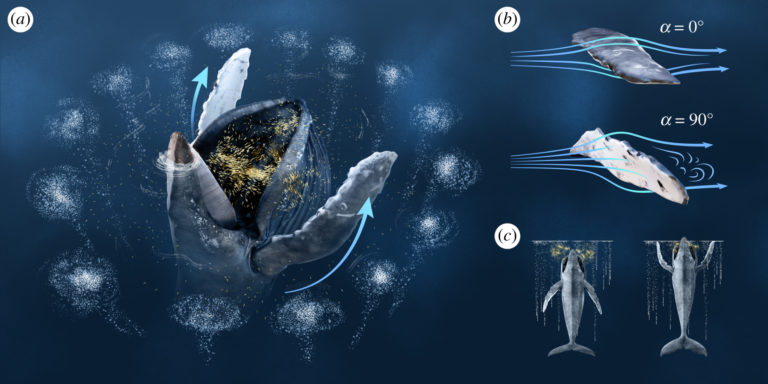A group of scientists monitoring whales off the coast of Alaska captured drone footage of humpback whales using a clever herding technique involving their fins to draw salmon towards them.

Graphical representation of vertical pectoral herding by Whale B in Southeast Alaska. Image: Kyle Kosma/ Royal Society Open Science
Humpback whales have very long pectoral fins or flippers, which according to a new study, aids in navigating shallow water, acceleration and increasing mobility.
New technology has enabled researchers to monitor and evaluate the suspicion that humpbacks may use their flippers to deceive and confuse prey and herd fish closer to their mouths.
In the video footage below, which features sightings of a whale near a salmon breeding sites near Alaska, a whale can be seen using its pectoral fins in a horizontal or vertical herding technique to guide the salmon nearer its mouth before taking a large gulp.
Pectoral herding: an innovative tactic for humpback whale foraging from Madison Kosma on Vimeo.
Whales like the humpback (among the largest of the rorquals, which have pleated throat grooves) lunge-feed by opening their mouths wide to engulf water and filter food and nutrients through their baleen, and then usually close them quite quickly again.
It’s uncertain whether all humpback whales employ this same herding and foraging technique as exhibited by the whales near the salmon hatchery area.
Find out more about this foraging technique and humpback whales in the study ‘Pectoral herding: an innovative tactic for humpback whale foraging’ published in the journal Royal Society Open Science.
Also read:
Durban’s Bluff declared world Whale Heritage Site
Humpback whale nearly gobbles cheeky sea lion
You may also like
Related Posts
China’s National Health Commission has published a list of controversial coronavirus treatments that have animal...
read more
Warmer sea temperatures in the summer months, especially in February, were recorded and are believed...
read more
While people are stuck indoors due to the coronavirus pandemic, the penguins at the Two...
read more